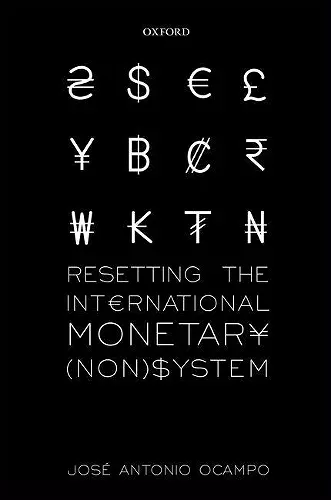Resetting the International Monetary (Non)System
Format:Hardback
Publisher:Oxford University Press
Published:16th Nov '17
Currently unavailable, and unfortunately no date known when it will be back

This is an open access title available under the terms of a CC BY-NC-SA 3.0 IGO licence. It is free to read at Oxford Scholarship Online and offered as a free PDF download from OUP and selected open access locations. International financial crises have plagued the world in recent decades, including the Latin American debt crisis of the 1980s, the East Asian crisis of the late twentieth century, and the global financial crisis of 2007-09. One of the basic problems faced during these crises is the lack of adequate preventive mechanisms, as well as insufficient instruments to finance countries in crisis and to overcome their over-indebtedness. Resetting the International Monetary (Non)System provides an analysis of the global monetary system and the necessary reforms that it should undergo to play an active role in the twenty-first century and proposes a comprehensive yet evolutionary reform of the system. Criticising the ad hoc framework- a "(non)system"- that has evolved following the breakdown of the Bretton Woods arrangement in the early 1970's, Resetting the International Monetary (Non)System places a special focus on the asymmetries that emerging and developing countries face, analysing the controversial management of crises by the International Monetary Fund and proposing a consistent set of reform proposals to design a better system of international monetary cooperation. Policy orientated and structured to deal in a sequential way with the issues involved, it suggests provision of international liquidity through a system that mixes the multicurrency arrangement with a more active use of the IMF's Special Drawing Rights; stronger mechanisms of macroeconomic policy cooperation, including greater cooperation in exchange rate management and freedom to manage capital flows; additional automatic balance-of-payments financing facilities and the complementary use of swap and regional arrangements; a multilateral sovereign debt workout mechanism; and major reforms of the system's governance.
José Antonio Ocampo, one of the world class economists, offers us here the elements of a comprehensive yet evolutionary reform of the international monetary system. This book is a urgent read for the G20, and for all those who consider a stable system to be key to international public good. * Michel Camdessus, former IMF Managing Director *
This book is a must-read for all who want to understand the gaps of the international monetary system, as well as the links between the workings of national economies and of that system. It is remarkable not only in providing a truly global perspective but also a deep analysis of the flaws of the system vis-à-vis emerging and developing countries. * Kemal Dervis, Vice-President and Director of Global Economy and Development at Brookings Institution, USA. *
José Antonio Ocampo is one of the most thoughtful critics of the international monetary system, but more significantly he is a prolific source of ideas for its reform. Implementing such ambitious reforms will not be easy - there are formidable diplomatic and political obstacles to overcome - but a first important step is to be clear on the concepts. There's no one better than Ocampo at conceptualizing the system, its flaws, and its fixes. * Barry Eichengreen, Professor at the University of California at Berkeley, USA *
Once in a while one comes across something that is so self-evidently right that one is momentarily surprised that it has not already been introduced, until one reflects on the current mediocre leadership of the world economy. That was my reaction on reading José Antonio Ocampo's tour de force on reforming the international monetary system. On topic after topicreserves, adjustment, the capital account, emergency financing, debt workouts, the institutional infrastructurehe combines reason with judgment of what may reasonably be sought. * John Williamson, Senior Fellow at the Peterson Institute for International Economics, USA. *
ISBN: 9780198718116
Dimensions: 241mm x 164mm x 24mm
Weight: 614g
296 pages